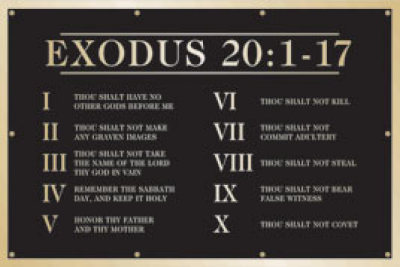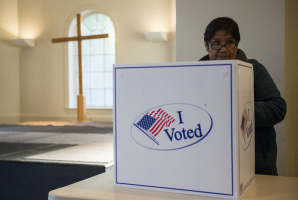Pennsylvania High School Ten Commandments Display Can Stay on Public Property, Judge Rules

A judge has ruled that a Ten Commandments monument located on the grounds of a Pennsylvania high school can remain.
In a decision rendered earlier this week, U.S. District Judge Terrence F. McVerry ruled in favor of New Kensington-Arnold School District against the arguments of an atheist group.
"Plaintiffs … have failed to establish that they were forced to come into 'direct, regular, and unwelcome contact with the' Ten Commandments monument on the grounds of Valley High School," wrote Judge McVerry.
"Because Plaintiffs lack standing, the Court's inquiry is concluded. The Court lacks subject matter jurisdiction to address the merits of Plaintiffs' claims, and this action must be dismissed."
McVerry also wrote in the opinion that the plaintiff's legal issue with the monument "seems to have manifested itself only after FFRF became involved in this dispute …"
"In the Court's view, this delayed reaction undermines Schaub's claim to standing. Regardless of how she might feel now, if she did not feel that way when she actually encountered the monument, then she is no different from someone who has never come in contact with the monument," continued McVerry.
"Having such an objection does not give an individual standing to sue, however. In sum, Schaub lacks standing, and as a result, so too does the Freedom From Religion Foundation."
For decades, a six foot tall monument of the Ten Commandments has stood at Valley High School near the entrance to the public school's gymnasium.
It was donated in 1957 by the Fraternal Order of Eagles, which during that time was erecting Decalogue displays on public property throughout the United States.
In March 2012, the Madison, Wisconsin-based group Freedom From Religion Foundation filed suit against the school district on behalf of a few local residents who took issue with the display.
After the school district refused to remove the monument, the FFRF filed a lawsuit in September 2012 in U.S. District Court for the Western District of Pennsylvania.
"District students come into contact with the monument while attending or visiting Valley High School," read the complaint.
"The plaintiffs seek a declaration that the District's practice of displaying the Ten Commandments in front of its public school is unconstitutional, an injunction requiring the Ten Commandments to be removed from public school property, nominal damages, and attorneys' fees and costs."
During the legal proceedings, clergy and the grassroots organization "Thou Shalt Not Move" held vigils and rallies in support of the monument staying at its present location.
In response to the McVerry ruling, FFRF released a statement expressing disappointment with the ruling and taking issue with the claim that the plaintiffs lacked standing.
"The opinion did not address the constitutionality of the monument in front of Valley High School," stated the FFRF.
"Ms. Schaub withdrew her child from the school because of the Ten Commandments Monument. … Thus, the plaintiffs' standing should be even more apparent since they altered their conduct to avoid the school."




























